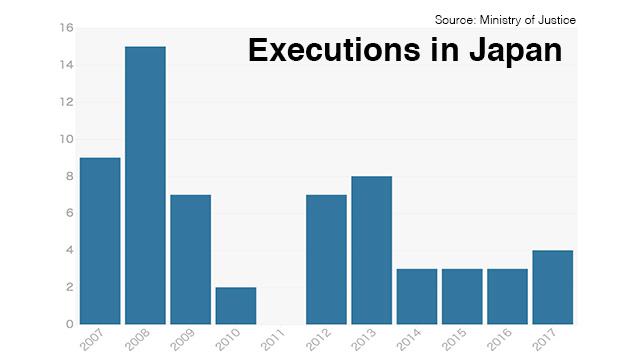Shoko Asahara, whose real name was Chizuo Matsumoto, and six of his former disciples were executed on July 6th. The 7 executions are believed to be one of the largest single-day totals under Japan's post-war Constitution.
13 Sentenced to Death
The Aum Shinrikyo cult released sarin gas in the Tokyo subway system in March of 1995, killing 13 people and injuring more than 6,000. The group also carried out other murders of those opposed to their activities.
The 63-year-old Matsumoto and 12 other Aum members were sentenced to death for their involvement in the series of crimes that left 29 people dead. Half of them were executed along with Matsumoto.

EU Critical of Japan
Japan and the US are the only G7 countries that have the death penalty. The Delegation of the European Union to Japan and ambassadors of European nations issued a joint statement in the wake of the executions.
It says they share the suffering of the victims and their families and condemn terrorist attacks. However, it also says the death penalty is cruel and inhumane and is not an effective crime deterrent.
The statement also says errors are inevitable in any legal system and calls on the Japanese government to adopt a moratorium on execution, with a view to abolishing it.

Justice Minister Yoko Kamikawa told reporters she signed the order three days before the execution. She said that, although extreme caution should be exercised when carrying out a death sentence, it should be implemented strictly and fairly if the penalty has been finalized.
Kamikawa said courts hand down death sentence only for extremely heinous crimes, and only after full deliberation. She added that it was her job to deal with the matter in a careful, strict, and fair manner.

Majority Support
A government poll taken a couple years ago found about 80% of respondents support the death penalty.
But human rights groups in the country are calling for it to be abolished. And they point to how inmates are often only told several hours before they are executed as cruel.
The Justice Ministry says there are 116 death row inmates in detention centers across Japan.
Critics also raise the issue of Japan detaining inmates for long periods of time before executions. For example, Matsumoto and his former followers had been held for more than 20 years.
In Japan, executions related to organized crimes are usually not carried out while other suspects are at large because the sentenced inmates could serve as key witnesses in other trials. That was the case here. Even though the death sentences of the 13 members were finalized by 2011, the trials of other members dragged out until this January.
In most cases, executions are supposed to be carried out within 6 months. But it's ultimately down to the justice minister to decide the timing. It is not clear when the remaining 6 members will be executed. This is expected to fuel debate among human rights groups in the country and abroad.
In addition, some victims' families and survivors oppose the executions. They want the former cult members alive so they can continue to talk about their crimes. The families and survivors don't want the memories to fade away.
